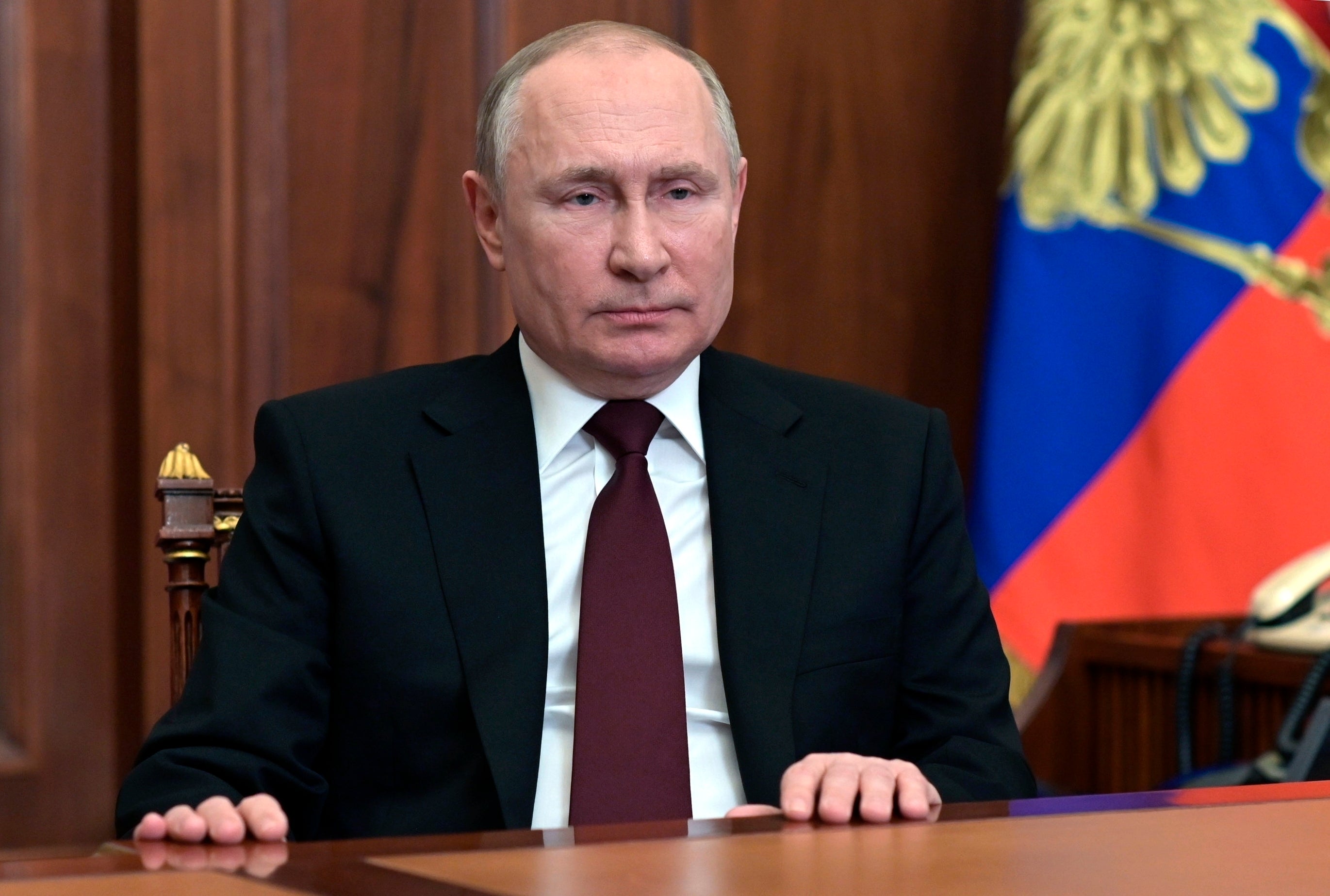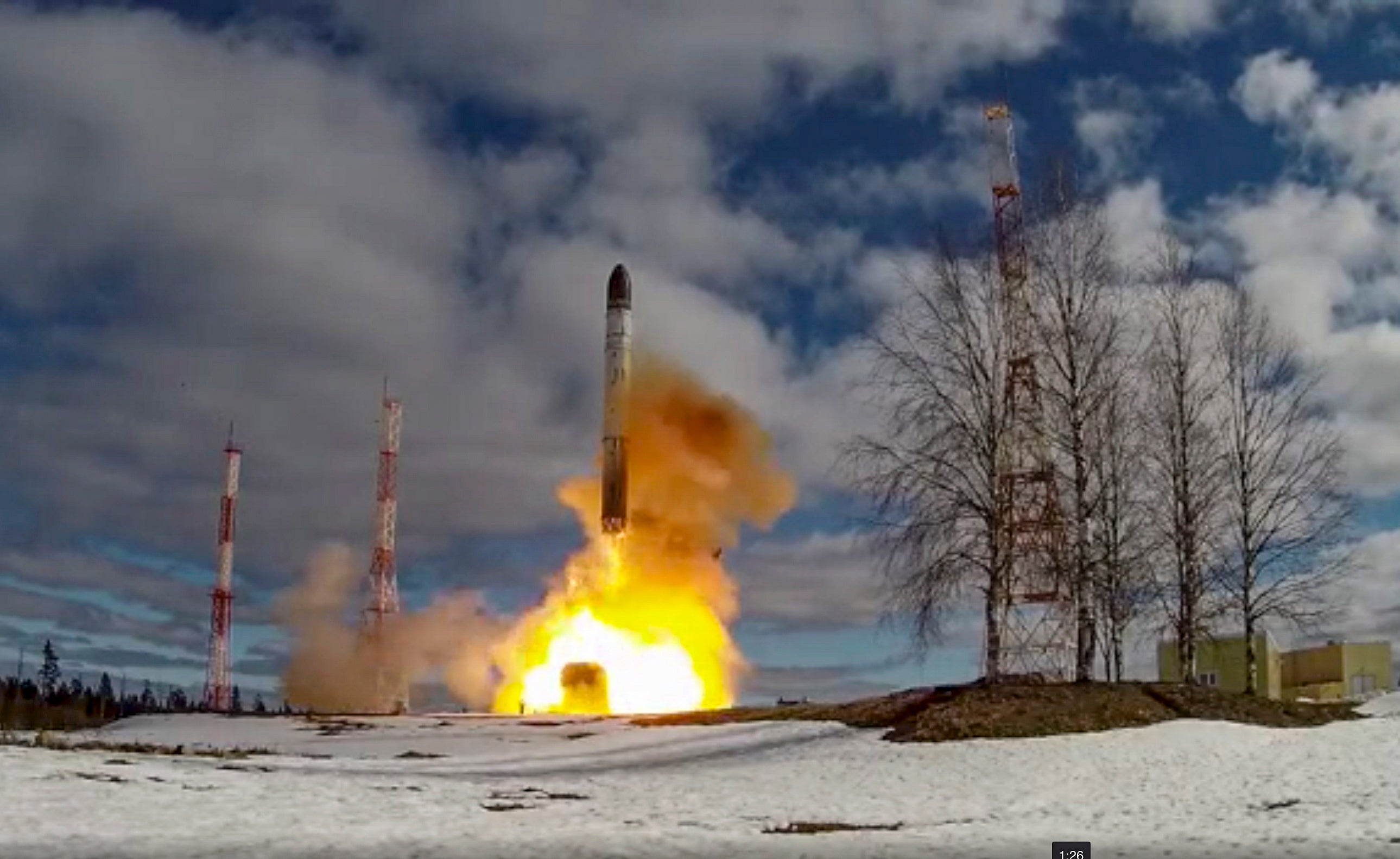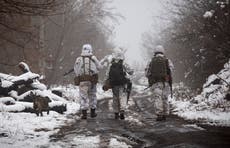How likely is it that Russia will launch a nuclear attack?
Vladimir Putin placed the Kremlin’s strategic nuclear weapons forces on ‘high alert’ at the start of the conflict and has continued his sabre-rattling ever since
Your support helps us to tell the story
From reproductive rights to climate change to Big Tech, The Independent is on the ground when the story is developing. Whether it's investigating the financials of Elon Musk's pro-Trump PAC or producing our latest documentary, 'The A Word', which shines a light on the American women fighting for reproductive rights, we know how important it is to parse out the facts from the messaging.
At such a critical moment in US history, we need reporters on the ground. Your donation allows us to keep sending journalists to speak to both sides of the story.
The Independent is trusted by Americans across the entire political spectrum. And unlike many other quality news outlets, we choose not to lock Americans out of our reporting and analysis with paywalls. We believe quality journalism should be available to everyone, paid for by those who can afford it.
Your support makes all the difference.Fierce fighting continues across south and eastern Ukraine more than 11 months into Russian president Vladimir Putin’s brutal invasion of his sovereign neighbour.
At the start of the war on 24 February, Mr Putin and his military officials were said to have been planning for an offensive that they believed would last only a matter of weeks.
But their troops have made few meaningful gains beyond the eastern Donbas or months, have failed to take Kyiv or remove Volodymyr Zelensky from power and appear to have grossly underestimated the defensive force and collective unity of Ukraine, which, backed with arms and funding from its Western allies, has held the Kremlin’s forces at bay admirably and launched successful offensive assaults of its own.
In fact, Russian soldiers have met with such stiff resistance as to inspire fears that a frustrated Mr Putin could eventually unleash a nuclear attack out of petulance and desperation.
During the first weekend of the war, he placed the country’s strategic nuclear weapons forces on high alert and has repeated the threat subsequently as a warning against the Nato allies’ opposition towards his actions.
But is it really likely that Russia would ever launch a nuclear strike against its neighbour or its adversaries further west?
What has Vladimir Putin said regarding nuclear weapons?
During a meeting on Sunday 27 February 2022, Russian television footage showed Mr Putin meeting with his defence minister and the chief of the general staff and instructing them to put the nuclear weapons on a “special regime of combat duty”.
Outlining what this meant, Patricia Lewis, director of the international security programme at the think-tank Chatham House, said: “What we think has happened is that under peacetime, Russia has checks and balances in place so that they can’t launch nuclear weapons.
“So in order to be able to launch nuclear weapons, President Putin has to change the status from peacetime to combat, hence the phrase he’s ‘put his forces on special mode of combat duty’. I think we would probably call it combat readiness but it’s hard because of different languages and different meanings.
“What he seems to have done is created the legal platform to be able to launch if he wishes,” she added.
Professor Malcolm Chalmers, deputy director general of the Royal United Services Institute, said that wording had not been used before, so it is not “entirely clear” what was meant.

“I haven’t seen any reporting of changes in Russian nuclear forces postures,” he said. “Obviously I don’t have access to classified intelligence but I haven’t seen reports as such.
“So it’s not clear how that changes. It may be something to do with the particular authorisation mechanisms between the president and the nuclear forces or it may be nothing at all. What is clear is that this is designed to be something that we need to listen to. It’s designed to be a reminder that Russia is a nuclear weapons power.”
More recently, after announcing the “partial mobilisation” of another 300,000 conscripts on 21 September, a policy that caused many young Russian men to flee the country to avoid the draft, Mr Putin again warned the West against “nuclear blackmail”, implying that he could be attempt to respond to threats with his own arsenal.
In a warning to Nato, he declared: “I would like to remind you that our country also has various means of destruction, and for some components more modern than those of the Nato countries.”
How likely is a nuclear attack?
Last year, UK defence secretary Ben Wallace attempted to pour cold water on fears of a nuclear war, stating that while he understood the concerns, the phrasing is a “battle of rhetoric”.
During media interviews, he told Sky News he “was not going to speculate” on what Mr Putin might do in the future.
Later on, he told BBC Breakfast: “We don’t see or recognise in the sort of phrase or the status he described as anything that is a change to what they have currently as their nuclear posture.
“This is predominantly about Putin putting it on the table just to remind people, remind the world, that he has a deterrent.
“We will not do anything to escalate in that area, we will not do anything to feed any miscalculation, we take it very, very seriously.
“But at the moment this is a battle of rhetoric that President Putin is deploying, and we just have to make sure we manage it properly.”
Tom Tugendhat, then-chairman of the foreign affairs committee, meanwhile, stated that Russia sees battlefield nuclear weapons as simply “a bigger bang” and could give a military order to use them.
Some experts stated that it is unclear whether or not Mr Putin would go ahead with a nuclear attack, while others quashed the possibility, stating that the mutual destruction would be too great.
Ms Lewis previously said: “Now he’s moved to a situation of combat, he can [launch a nuclear attack]. But will he? We don’t know. This is the problem.
“Of course, he wants to frighten us. And I think Russia has long worked out that the West is far more frightened of Russian nuclear weapons than Russia is frightened of Western nuclear weapons, and I think that’s true.”
She added: “There is a possibility to retaliate against conventional force with nuclear weapons under Western doctrines, but it is generally believed that would be a last resort.
“I think there’s been a sense over the last decade that Putin, along with [North Korean leader] Kim Jong-un and [former US president] Donald Trump, are people who could have just launched a nuclear weapon. So there’s always been this unpredictability… I don’t want to overplay it but I don’t want to downplay it either.”

Professor Chalmers meanwhile said that he thought it was “unlikely”, adding: “Because any use of nuclear weapons would open up such a Pandora’s box, and the possibility of escalation to the use of more nuclear weapons once one country has used them, the pressure on other nuclear weapon states to use them in response would be very considerable… the Russians understand that and so do the west. So it’s a paradox.”
Responding to media speculation in August that the Kremlin might resort to nuclear weapons, Sergei Shoigu, Russia’s defence minister, described the claims as “absolute lie”.
“From a military point of view, there is no need to use nuclear weapons in Ukraine to achieve the set goals. The main purpose of Russian nuclear weapons is to deter a nuclear attack,” he claimed.
“The media are spreading speculation about the alleged use of Russian tactical nuclear weapons in the course of the special military operation, or about the readiness to use chemical weapons. All these informational attacks are absolute lies.”
He also alleged Ukrainian military operations were being planned by the US and Britain and that Nato had increased its troop deployment in eastern and central Europe “several times over”.
Referring to the New START Treaty to control US and Russian nuclear arms, Mr Shoigu said talks to extend the treaty were “a two-way street” and the situation around it was “difficult”.
“A difficult situation is also developing with regard to the Treaty on the Limitation of Strategic Offensive Arms. The agreement remains in force until 2026,” Mr Shoigu added.
“On the Russian side, obligations are being fulfilled, the declared levels of carriers and warheads are maintained within the established limits.”
What could happen in a nuclear attack?
If Russia launched an attack on a Nato country, experts have said there could be retaliatory strikes from other alliance nations, prompting a conflict that Professor Chalmers said would lead to “orders of magnitude worse than the Second World War”.
Numbers of casualties would depend on what area was attacked. Nuclear weapons have the capability to kill hundreds of thousands of people depending on how populated an area is that is targeted.
Others could be left injured as a result of radiation poisoning if a specific facility is targeted instead.
What nuclear weapons does Russia have?
The Bulletin of Atomic Scientists, which has published an account of world nuclear arsenals compiled by leading experts from the Federation of American Scientists since 1987, updated its records on Russia’s nuclear arsenal in February.
At the time, it said the stockpile was approximately 4,477 warheads, of which around 1,588 are strategic warheads that can be deployed on ballistic missiles and at heavy bomber bases, while an approximate additional 977 strategic warheads, along with 1,912 nonstrategic warheads, are held in reserve.
What about the rest of the world?
According to the Federation of American Scientists, figures from 2022 state that the UK has a stockpile of approximately 225 nuclear warheads, while the US has 5,428, France has 290, Pakistan has 165, China has 350, India has 160, Israel has 90 and North Korea has 20.
The Independent has a proud history of campaigning for the rights of the most vulnerable, and we first ran our Refugees Welcome campaign during the war in Syria in 2015. Now, as we renew our campaign and launch this petition in the wake of the unfolding Ukrainian crisis, we are calling on the government to go further and faster to ensure help is delivered. To find out more about our Refugees Welcome campaign, click here. To sign the petition click here. If you would like to donate then please click here for our GoFundMe page.




